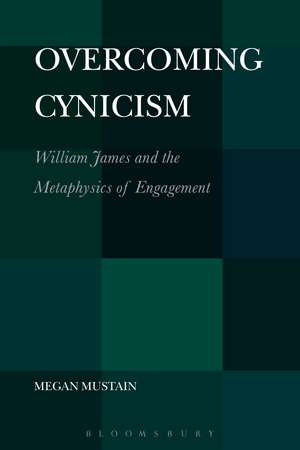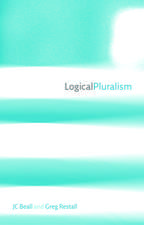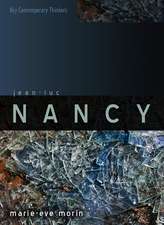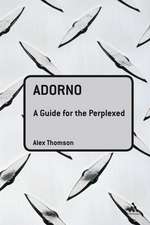Overcoming Cynicism: William James and the Metaphysics of Engagement
Autor Dr. Megan Mustainen Limba Engleză Hardback – 16 mar 2011
| Toate formatele și edițiile | Preț | Express |
|---|---|---|
| Paperback (1) | 255.58 lei 6-8 săpt. | |
| Bloomsbury Publishing – 26 feb 2014 | 255.58 lei 6-8 săpt. | |
| Hardback (1) | 772.65 lei 6-8 săpt. | |
| Bloomsbury Publishing – 16 mar 2011 | 772.65 lei 6-8 săpt. |
Preț: 772.65 lei
Preț vechi: 1112.25 lei
-31% Nou
Puncte Express: 1159
Preț estimativ în valută:
147.95€ • 152.45$ • 124.16£
147.95€ • 152.45$ • 124.16£
Carte tipărită la comandă
Livrare economică 22 februarie-08 martie
Preluare comenzi: 021 569.72.76
Specificații
ISBN-13: 9781441115225
ISBN-10: 1441115226
Pagini: 200
Dimensiuni: 152 x 229 x 14 mm
Greutate: 0.46 kg
Ediția:New.
Editura: Bloomsbury Publishing
Colecția Continuum
Locul publicării:New York, United States
ISBN-10: 1441115226
Pagini: 200
Dimensiuni: 152 x 229 x 14 mm
Greutate: 0.46 kg
Ediția:New.
Editura: Bloomsbury Publishing
Colecția Continuum
Locul publicării:New York, United States
Caracteristici
Provides fresh insights into the clash of scientific and religious worldviews in the contemporary world.
Notă biografică
Megan R. Mustain is Assistant Professor of Philosophy at St. Mary's University in San Antonio, Texas, USA.
Cuprins
AcknowledgmentsIntroductionChapter 1 - Historical Cynicism: Diogenes and the VictoriansChapter 2 - Contemporary Sources of Cynicism: Fundamentalism and ScientismChapter 3 - A Diagnosis of Disconnection at the Heart of CynicismChapter 4 - In Search of Alternatives: Coping with Relatedness Chapter 5 - Engaging and Reconstructing Relations: Concluding Remarks and a Path ForwardBibliographyIndex
Recenzii
Mustain's well-crafted meditation on cynicism is both timely and provocative. Drawing on four case studies, from fourth-century B.C.E. Athens to twentieth century Christian fundamentalism, she skillfully diagnoses cynicism as a metaphysical disorder of disconnectedness and provides a welcome prescription that draws on William James's investigation of felt relations.
Overcoming Cynicism is a bold and originating diagnosis of an ancient contention, which flails us to this very day. If ultimate certitude is beyond our reach, what then is the possibility of possibility, the meaning and presence of hope and the actuality of human growth? Megan Mustain takes on this central human conflict with high intelligence, rhetorical verve and informed philosophical acuity. I welcome Megan Mustain to the newest generation of creative and wise interpreters of our rich intellectual tradition as rooted in Classical American Philosophy.
Megan Mustain has put the ideas of William James to work in the twenty-first century. She offers a diagnosis of our present and ongoing inabilities to deal with our existential instabilities by way of the history and presence of cynicism. The cynics of disjunction-Diogenes and contemporary scientism-fail to see the importance of conjunctive relations and thus are blind to possibility and the human ability to create meaning. The cynics of conjunction-Victorian colonialism and contemporary religious fundamentalism-try to ignore in ostrich-like fashion our existential disconnectedness offering instead a blind faith in an as yet incompleted ontological whole. Drawing on James's radical empiricism, Mustain suggests we recognize the importance of both sorts of relations and engage our existential situation with hope not certainty, with possibility not necessity. Though philosophical in temper, this book reaches into our dealings with the everyday world and asks us to acknowledge the risks and to create meaning whenever possible-for Mustain, as for Aristotle, Margaret Fuller, and William James, life is more than surviving and less than becoming divine. Overcoming cynicism is not achieved by way of a universal game plan but through our individual and communal dealings with the problems of material and spirit that are at hand for us.
This book is valuable for its perspicuity of human character through a range of philosophical and cultural movements, from ancient to contemporary, and for its courage in suggesting practical solutions. Summing Up: Recommended. Lower-level undergraduates through researchers/faculty; general readers.
[The author] has given us a book that is truly engaging... a book that will help overcome the cynicism of anyone who reads it.
Overcoming Cynicism is a bold and originating diagnosis of an ancient contention, which flails us to this very day. If ultimate certitude is beyond our reach, what then is the possibility of possibility, the meaning and presence of hope and the actuality of human growth? Megan Mustain takes on this central human conflict with high intelligence, rhetorical verve and informed philosophical acuity. I welcome Megan Mustain to the newest generation of creative and wise interpreters of our rich intellectual tradition as rooted in Classical American Philosophy.
Megan Mustain has put the ideas of William James to work in the twenty-first century. She offers a diagnosis of our present and ongoing inabilities to deal with our existential instabilities by way of the history and presence of cynicism. The cynics of disjunction-Diogenes and contemporary scientism-fail to see the importance of conjunctive relations and thus are blind to possibility and the human ability to create meaning. The cynics of conjunction-Victorian colonialism and contemporary religious fundamentalism-try to ignore in ostrich-like fashion our existential disconnectedness offering instead a blind faith in an as yet incompleted ontological whole. Drawing on James's radical empiricism, Mustain suggests we recognize the importance of both sorts of relations and engage our existential situation with hope not certainty, with possibility not necessity. Though philosophical in temper, this book reaches into our dealings with the everyday world and asks us to acknowledge the risks and to create meaning whenever possible-for Mustain, as for Aristotle, Margaret Fuller, and William James, life is more than surviving and less than becoming divine. Overcoming cynicism is not achieved by way of a universal game plan but through our individual and communal dealings with the problems of material and spirit that are at hand for us.
This book is valuable for its perspicuity of human character through a range of philosophical and cultural movements, from ancient to contemporary, and for its courage in suggesting practical solutions. Summing Up: Recommended. Lower-level undergraduates through researchers/faculty; general readers.
[The author] has given us a book that is truly engaging... a book that will help overcome the cynicism of anyone who reads it.
Descriere
Examines the metaphysical underpinnings of cynical philosophies both past and present in an attempt to diagnose and ameliorate contemporary forms of cynicism.
















